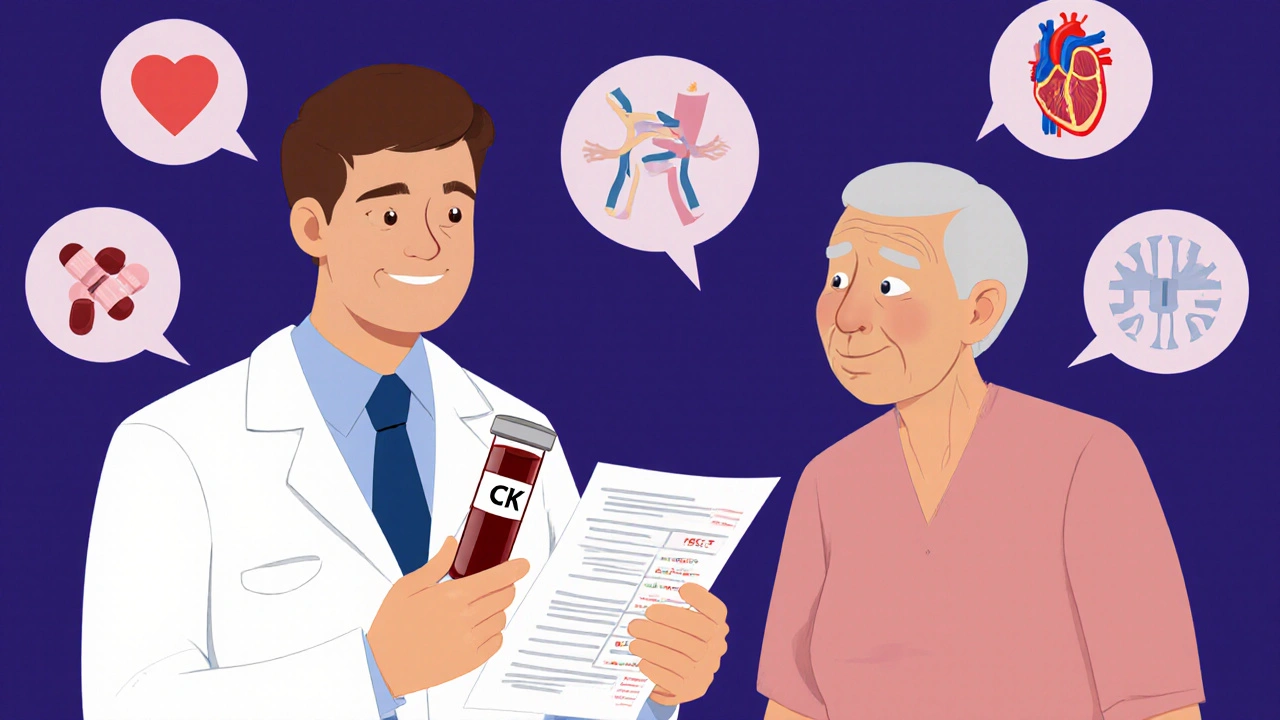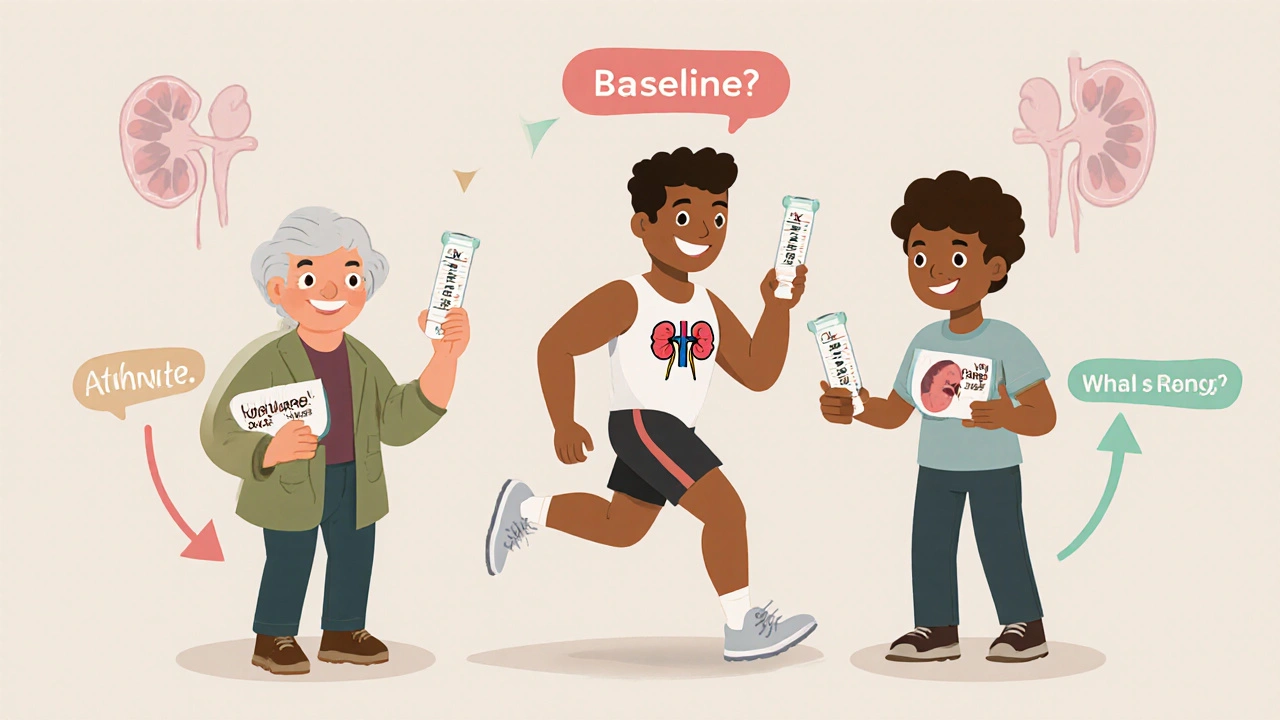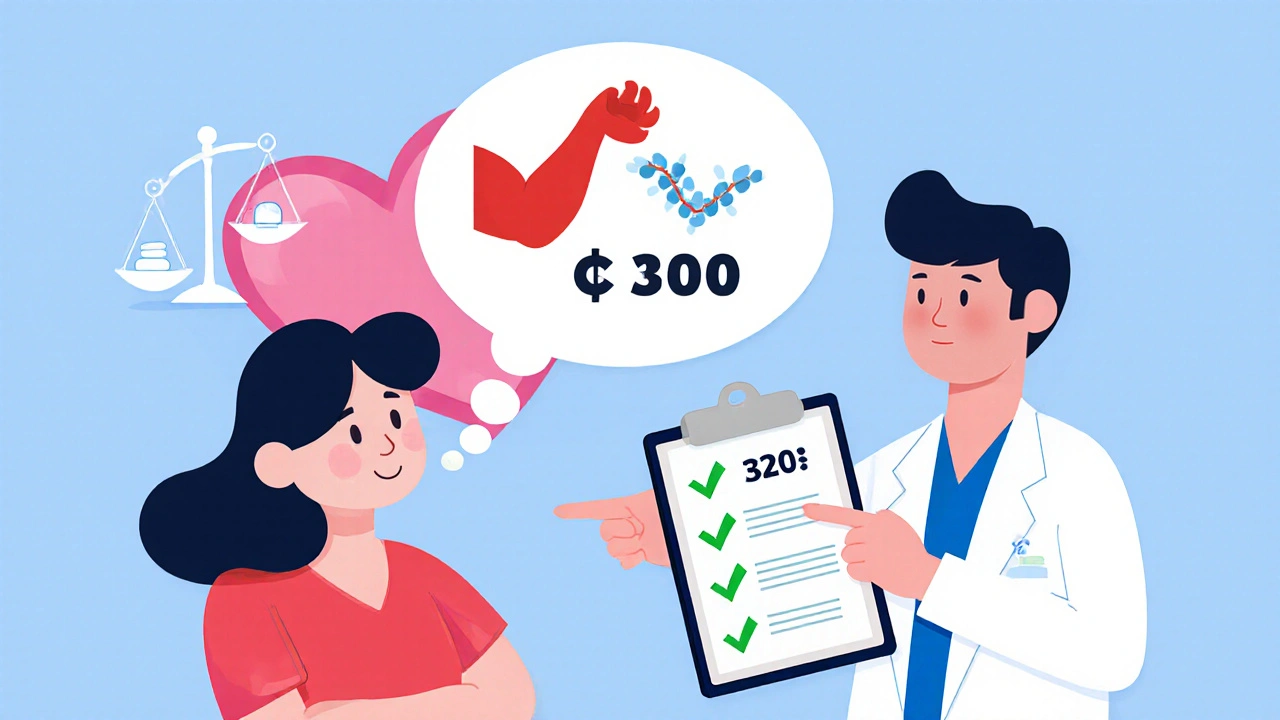When to Test CK Before Starting Statins: A Practical Guide

CK Test Decision Checker
This tool helps you determine if you should get a baseline CK test before starting statin medication based on your personal risk factors. A CK test measures creatine kinase levels in your blood, which can help identify muscle damage that might be related to statin therapy.
Answer these questions to see if you should consider a baseline CK test before starting statins.
Recommendation
Starting a statin can be a life-saving decision for many people. But for some, the fear of muscle pain or weakness keeps them from taking the medication - even when their doctor says it’s necessary. That’s where baseline CK testing comes in. Not everyone needs it. But for certain patients, getting a creatine kinase (CK) blood test before starting statins can prevent unnecessary stoppages, reduce anxiety, and help doctors make smarter calls.
Why CK Matters with Statins
Creatine kinase is an enzyme found in muscle tissue. When muscles get damaged - from intense exercise, injury, or a reaction to a drug - CK leaks into the bloodstream. High levels signal muscle stress. Statins, while generally safe, can cause muscle damage in rare cases. The most serious form, rhabdomyolysis, is life-threatening but extremely rare (less than 0.1% of users). More common is mild myalgia - muscle aches without real damage - which affects 5-10% of people on statins. The problem? Many people feel muscle soreness and assume it’s the statin. But in up to 78% of cases, studies show the pain isn’t caused by the drug at all. It could be from aging, inactivity, arthritis, or even stress. Without knowing a patient’s normal CK level, doctors can’t tell if the statin is the culprit.Who Really Needs a Baseline CK Test?
Routine CK testing for everyone starting statins isn’t recommended. But there are clear groups where it makes sense:- Patients over 75 years old - muscle mass declines with age, and kidneys may not clear statins as well.
- People with chronic kidney disease (eGFR below 60) - statins build up in the body, raising muscle toxicity risk.
- Those taking statins with other drugs like fibrates, amiodarone, or cyclosporine - these increase statin levels in the blood.
- Anyone with hypothyroidism - untreated thyroid issues raise CK levels and worsen statin-related muscle problems.
- Patients who had muscle pain on a previous statin - even if they stopped it, knowing their baseline helps decide if they can try again.
- People of African descent - baseline CK levels are often 50-100% higher due to natural muscle mass differences.
For these groups, a baseline CK test isn’t just helpful - it’s essential. It gives doctors a personal reference point. If CK was 400 U/L before starting the statin and climbs to 600 U/L after, that’s not alarming. But if it was 120 U/L and jumps to 800 U/L, that’s a red flag.
What’s Normal? It Depends on You
Lab reference ranges say normal CK is 65-110 U/L for women and 145-195 U/L for men. But these numbers are averages. Real life is messier. A 2019 study found that 25-30% of healthy people have CK levels above the lab’s “normal” range - not because they’re sick, but because they lift weights, play sports, or had an injection in their arm recently. One man I know, a 68-year-old gardener, had a CK of 320 U/L before starting atorvastatin. His doctor didn’t panic. They knew his baseline. He stayed on the statin. No issues. That’s why testing before you start matters. A “high” CK isn’t always a problem - it’s only a problem if it’s higher than your usual level.
When CK Levels Rise After Starting Statins
If you start a statin and get muscle aches, your doctor may order another CK test. Here’s how to interpret it:- CK under 3x the upper limit of normal (ULN) - no action needed. Keep taking the statin. Symptoms are likely not drug-related.
- CK 3-10x ULN with symptoms - pause the statin, check thyroid and kidney function, and consult a specialist. You might restart a lower dose or switch drugs.
- CK over 10x ULN - stop the statin immediately. This signals possible rhabdomyolysis. Urgent care is needed.
Important: CK levels don’t always match how you feel. Some people feel terrible with only a slight rise. Others feel fine with CK levels three times normal. That’s why symptoms matter as much as numbers.
International Differences - Why Guidelines Vary
Not all countries agree on baseline CK testing. In Japan, it’s mandatory for everyone. Why? Studies show higher rates of statin-related muscle problems there - about 12.7% versus 7.3% in the U.S. and Europe. Cultural factors, genetics, and diet may play a role. In the U.S., the American College of Cardiology says baseline testing is useful for high-risk patients but not for everyone. The European Society of Cardiology calls it optional. Canada’s RxFiles guidelines are clear: test before you start if you’re in a high-risk group - but don’t test every six months just because you’re on a statin.The key takeaway? Guidelines aren’t one-size-fits-all. They’re based on population data. Your individual risk matters more.
What About Genetic Testing?
A gene called SLCO1B1 affects how your body processes statins. People with a certain variant (found in about 12% of Europeans) have a 4.5 times higher risk of muscle damage on simvastatin. Genetic testing for this variant sounds promising - and it’s available. But here’s the catch: it’s expensive, not widely covered by insurance, and doesn’t help with all statins. Rosuvastatin and pravastatin aren’t affected as much. Plus, most people with the gene variant never develop symptoms. So while it’s a useful tool in research, it’s not yet a replacement for baseline CK testing in routine care.
What to Do Before Your CK Test
If you’re scheduled for a baseline CK test, here’s how to make sure it’s accurate:- Avoid intense exercise for at least 48 hours before the test. Even a long hike or heavy weight session can spike CK.
- Don’t get intramuscular shots (like vaccines or steroids) in the week before testing.
- Tell your doctor about any supplements or herbs you take - some, like red yeast rice, act like statins.
- Write down your recent activity level. Did you play tennis last weekend? Walk 10,000 steps daily? This helps your doctor interpret the result.
Don’t skip the test just because you feel fine. The goal isn’t to catch a problem before it starts - it’s to have a baseline so you know what’s normal for you.
The Cost and the Catch
Some critics argue baseline CK testing isn’t worth it. A 2023 Canadian analysis found that $14.7 million was spent yearly on these tests - but only 1.2% of abnormal results changed how patients were treated. That sounds wasteful. But here’s the flip side: when patients report muscle pain and doctors don’t have a baseline, they often stop the statin. And that’s dangerous. For someone with heart disease, stopping a statin increases their risk of heart attack or stroke by 30-50% over the next year. Real-world data from the 2023 Statin Safety Registry shows clinics that routinely checked baseline CK had 22% fewer unnecessary statin discontinuations. Each avoided stoppage saved about $2,850 in follow-up visits, repeat testing, and emergency care.The Bottom Line
Baseline CK testing isn’t for everyone. But for people with risk factors - older age, kidney issues, certain medications, or prior muscle symptoms - it’s one of the smartest, cheapest, and most practical tools doctors have to keep statins safe and effective.If you’re starting a statin and fall into one of the high-risk groups, ask your doctor: “Should I get a CK test before I begin?” Don’t assume it’s unnecessary. Don’t assume it’s mandatory. Ask. Get the data. Know your number. That’s how you make sure the statin helps - not hurts - your health.
Do I need a CK test before starting a statin if I feel fine?
Not if you’re young, healthy, and have no risk factors. But if you’re over 75, have kidney disease, take other medications like fibrates or amiodarone, have hypothyroidism, or had muscle pain on statins before - yes. Even if you feel fine, a baseline test gives your doctor a personal reference point to compare against later if symptoms appear.
Can a high CK level mean I have a muscle disease?
Possibly. A very high CK level - especially if it’s been high for a while - could point to an undiagnosed neuromuscular condition like muscular dystrophy or polymyositis. That’s why doctors look at your history, symptoms, and whether the CK was high before you started the statin. If your baseline was already elevated, your doctor may refer you to a neurologist to rule out other causes.
Is it safe to restart a statin after stopping due to muscle pain?
Yes, in most cases. Studies show that 70-80% of people who stop a statin due to muscle pain can tolerate a different statin or a lower dose after a break. The key is restarting slowly - often with pravastatin or fluvastatin, which are less likely to cause muscle issues. Baseline CK data helps doctors decide whether the pain was truly from the drug or something else.
Do I need to retest CK every few months while on statins?
No. Major guidelines from the ACC, AHA, and ESC agree that routine CK monitoring in asymptomatic patients provides no benefit. Only test again if you develop new muscle pain, weakness, or dark urine. For those on statin-fibrate combos, testing every 6 months is advised due to higher risk.
What if my CK is high but I feel fine?
If your CK is elevated but you have no symptoms, most doctors will keep you on the statin - especially if your level is under 3x the upper limit of normal. Many healthy people have naturally high CK due to muscle mass, exercise, or genetics. What matters is whether the level is stable or rising. If it’s stable and you feel fine, it’s likely not a problem.
15 Comments
Julie Pulvino
Love this breakdown. So many people panic about muscle aches and quit statins without realizing their CK was already high from lifting or hiking. Baseline tests are cheap insurance.
Patrick Marsh
Exactly. No need to test everyone. But if you're over 70, on multiple meds, or have kidney issues? Do it.
Danny Nicholls
Just had my CK checked before starting rosuvastatin-was 380 U/L. Doc laughed and said, 'You're a gardener, not a patient.' 😅 Stayed on it. No issues. Baseline saved me from a useless panic.
David Cunningham
Aussie here-our guidelines are pretty much the same as the US. But I’ve seen GPs order CKs for everyone just to ‘be safe.’ It’s unnecessary. Glad someone finally laid this out clearly.
Latonya Elarms-Radford
It’s fascinating how medicine still clings to population averages while ignoring the profound individuality of human biology. We measure CK like it’s a universal metric, when in truth, your muscle mass, your ancestry, your lifestyle-these are not variables to be normalized, but signatures of your lived experience. The lab’s ‘normal’ range is a colonial relic, a statistical tyranny imposed on the diversity of human physiology. To say 195 U/L is ‘normal’ for men is to erase the 30% of healthy men who naturally sit at 300, 400, even 500. This isn’t pathology-it’s poetry written in enzymes. The real scandal isn’t the statin-it’s the refusal to see the person behind the number.
Ravi Kumar Gupta
Bro, in India, we see this all the time. Elderly patients stop statins because they feel ‘weak’-but they haven’t walked in weeks. Their CK was 280, and doc says ‘stop.’ Meanwhile, heart attacks rise. We need education, not just tests. Baseline CK? Yes. But also teach people: ‘Muscle sore ≠ statin problem.’
Miruna Alexandru
While the article presents a compelling case for targeted baseline CK testing, it fails to critically address the confounding influence of non-pharmacological variables-such as recent physical exertion, vitamin D status, or even hydration levels-that can artificially elevate CK. Furthermore, the cited Canadian cost-analysis, while statistically valid, omits the downstream economic burden of statin discontinuation, including increased cardiovascular events and associated hospitalizations. A true cost-benefit analysis must account for both direct and indirect costs, which the article only partially does.
Mark Williams
SLCO1B1 genotyping is still too expensive and low-yield for routine use, but in high-risk cohorts-especially those with prior myopathy-it’s worth considering. We’re moving toward precision medicine, but CK remains the most accessible, low-tech tool we’ve got right now. Don’t overcomplicate it.
Nikhil Chaurasia
I respect the intent of this post, but I worry about how this gets interpreted. If patients start demanding CK tests ‘just in case,’ we’ll overload labs. Doctors need clear guidelines-not more noise. Stick to the high-risk groups. Don’t turn this into a wellness trend.
Daniel Jean-Baptiste
My uncle had a CK of 500 before starting statins-he’s a 72-year-old who still does yoga and lifts his grandkids. Doc didn’t blink. He’s been on atorvastatin for 5 years. No issues. Baseline saved the day. Thanks for writing this.
Rahul Kanakarajan
Why are we even talking about this? Just don’t give statins to old people unless they’ve had a heart attack. It’s overprescribed. CK tests are just a band-aid for bad prescribing habits.
New Yorkers
It’s not about the CK. It’s about the system. We treat numbers like gods and people like glitches. You’re not a lab result. You’re a human being who climbs stairs, carries groceries, and worries about bills. If your doctor doesn’t see that, find a new one.
Robin Johnson
For anyone nervous about statins: start low, go slow. Pick pravastatin or fluvastatin. Get the baseline CK if you’re in a risk group. And if you feel weird? Don’t quit cold turkey. Talk to your doc. You’ve got this.
luke young
My mom had muscle pain on simvastatin. We checked her CK-was 210. Doc said, 'That’s her normal.' Switched to rosuvastatin. She’s been fine for 3 years. This post saved her life. Thanks!
james lucas
just wanted to say this is the most helpful thing i’ve read all year. i was about to quit my statin bc i thought my sore legs were from it, but i got my baseline checked and turns out i’ve had high ck since i was 25 from lifting. doc said keep going. i’m so glad i didn’t listen to my fear. statin saved my heart. 🙏

Write a comment